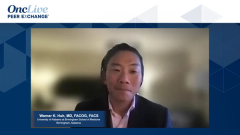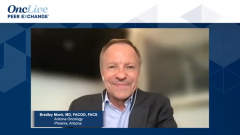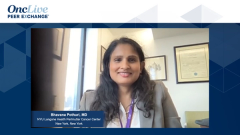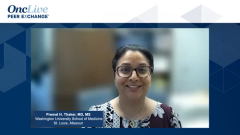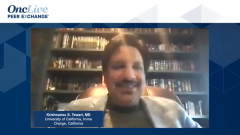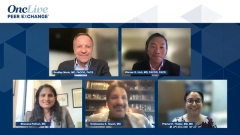
Locally Advanced Cervical Cancer: Interpreting the OUTBACK Trial
Considerations for the negative results of the OUTBACK trial, which tested adjuvant chemotherapy in locally advanced cervical cancer.
Episodes in this series

Transcript:
Bradley Monk, MD, FACOG, FACS: Dr Tewari chairs the publication committee for NRG Oncology and has written textbooks and many publications. One of the studies from our group, and you all participated in it, was called the OUTBACK trial. It was presented at the plenary session at the 2021 American Society of Clinical Oncology annual meeting. Dr Tewari, tell us about the OUTBACK trial and what that showed or didn’t show.
Krishnansu S. Tewari, MD: The OUTBACK trial was launched through the Australia New Zealand Gynaecological Oncology Group.
Bradley Monk, MD, FACOG, FACS: In the Outback.
Krishnansu S. Tewari, MD: Yes, in the Outback. The Outback doesn’t apply to New Zealand, but it does for Australia. The idea was to enroll 900 women with locally advanced cervical cancer, meaning cancer that had not metastasized but was too big to cut around—this included IB2, IIA, and up to stage IVA—and treat them with chemoradiation with or without adjuvant chemotherapy. The goal was to improve survival by giving 4 extra cycles of combination chemotherapy after they completed chemoradiation, but the trial was negative. This was a better prognosis group of patients than some of the patients we’ll be talking about later in this program, and the events took longer to occur. When we designed the trial, we didn’t have as much information on this disease as we do today, and we didn’t have the right medicines to be studying a “consolidation” therapy. It was unfortunately a negative study, it took a long time and it was a large international effort. The Gynecologic Oncology Group led the accrual once we joined the Australia New Zealand group.
Bradley Monk, MD, FACOG, FACS: We live and learn. Dr Huh, do you think that’s changed practice? Do you think people were giving 4 additional cycles of chemotherapy because it sounded like the right thing to do, or do you think they were waiting for the results of this trial?
Warner K. Huh, MD, FACOG, FACS: Unlike many things in the oncology world, where we adopt change despite not having level 1 evidence, I don’t know many people who would do that. We have this debate because of the Peters trial that was published many years ago and because they were treated past their RT [radiation therapy] and those patients did well. We’ve academically surmised that it played a role, and this puts that to rest. But we weren’t doing that. It’s interesting that in the endometrial cancer world, which is not on topic here, we had similar challenges. I think people were waiting for the data, and I haven’t seen people adapt that widely before the OUTBACK trial.
Bradley Monk, MD, FACOG, FACS: [Alfonso] Dueñas-González, [MD, PhD,] gave CIS/GEM [cisplatin/gemcitabine], that’s another opportunity. Dr Pothuri or Dr Thaker, why did it fail? Why did the OUTBACK trial, 4 additional cycles of chemotherapy after chemotherapy and radiation, fail?
Premal H. Thaker, MD, MS: It failed because it’s overall a good prognostic group. We don’t need to add additional treatments and therapies; that’s why it failed. We added toxicity, unfortunately.
Bradley Monk, MD, FACOG, FACS: The end point was OS [overall survival]. When you have 100% crossover, when you recur, you get platinum/taxane, so let’s give it earlier and assume we can improve overall survival. The design was flawed. We also learned that 6 doses of platinum and radiation is difficult, and almost a third of the patients could no longer participate .
Krishnansu S. Tewari, MD: They were randomized before they even started radiotherapy, and so a lot of them, by the time they were done, they were done.
Bradley Monk, MD, FACOG, FACS: Then finally, the intervention was wrong. The intervention today is chemotherapy, antiangiogenic, chemotherapy, checkpoint, or both. What do you think? Or is it too good of a prognostic group and we need to study a high-risk group?
Krishnansu S. Tewari, MD: We should study the high-risk group within the locally advanced, because some of the earlier stages in the locally advanced group have a very good prognosis. We didn’t have a lot of this information about activity of checkpoint, antiangiogenesis, and this trial took so long to complete because there were few events.
Bhavana Pothuri, MD: This is still an important study because people around the country have been giving additional chemotherapy. More is not better. We could have designed the trial differently, and we now have more effective agents. But I still think there is value in this trial, and it will help people to not give additional cycles just based on gestalt and smaller studies.
Transcript edited for clarity.


